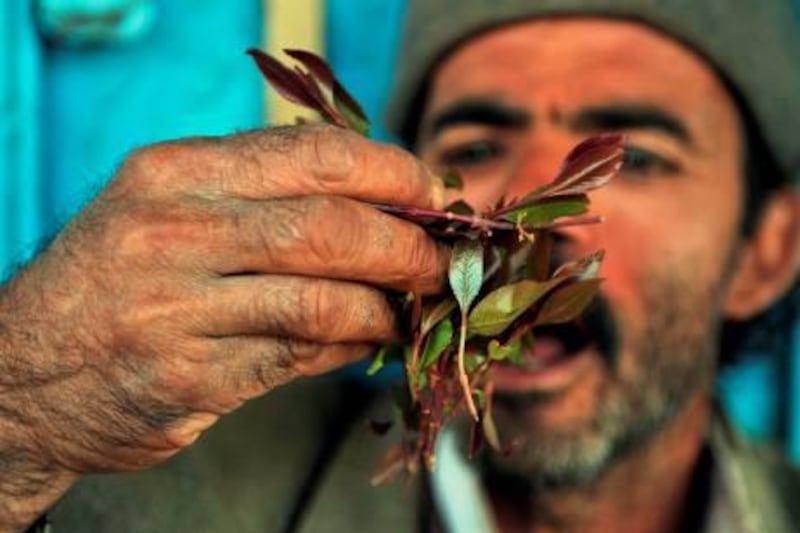SANAA // For one day, Yemeni protesters shifted their anger from their outgoing president, Ali Abdullah Saleh.
The new enemy No 1? The drug qat.
Much like the protests against the government, the campaign to end chewing of qat leaves was started on social networking websites.
On Thursday, thousands of people gathered in several cities to urge a one-day boycott of qat. Called "A Day without Qat", the campaign's goal was to raise awareness about its harmful effects.
"As a Yemeni who lives abroad, I hate the image that people have about Yemenis being occupied by this devilish tree. Besides, qat affects everything in Yemen: the economy, politics, and social life. Changing this bad habit would be a crucial step to achieving political change in Yemen", said Hind Aleryani, who launched the online campaign from her home in Lebanon.
Qat is a flowering evergreen shrub that produces leaves that many Yemenis chew. Qat is a stimulant that affects users much like cocaine.
About 30 per cent of Yemeni cancer patients have mouth and gum cancers by often illegal pesticides used on the country's qat and vegetables, according to Yemen's ministries of health and agriculture. A report by the ministries says that pesticides sprayed on qat is one of the main causes of cancer of the digestive system and kidney failure.
Qat chewers also lose their appetites and suffer from insomnia.
It is illegal in the UAE and many other countries, but is legal in Yemen, some East African countries and the UK.
Qat consumption and cultivation is considered a significant problem in Yemen.
In a country that is running out of water, an estimated 50 per cent its water resources go to the irrigation of qat trees. according to a Ministry of Water. There is so much qat cultivation that it is crowding out the growing of vegetables and coffee.
The drug is a part of everyday life for many in Yemen. An estimated 70 to 80 per cent of Yemeni men and women between the ages of 16 and 50 have chewed qat at least once, according to Al Afif Cultural Foundation. Families spend about 21 per cent of their income on qat.
Thursday's boycott seemed to have an effect on the sale of the drug. Qat sellers, particularly those around the protest camps, said sales were down by half. Others said they were unaware of the campaign.
Several leading figures in the protest movement against the government took part in the anti-qat campaign, including Tawakkul Karman, Yemen's Nobel Peace Prize winner, and Mohammed Abu Lahoum, a key opposition politician.
Some activists believe it would be impossible to make qat illegal in Yemen, but said consumption could be lowered. They cited a law in the former South Yemen that prohibited chewing the leaf except on weekends.
Wafa Al Walidi, one of the leading campaigners who lives in Taiz, said the campaign against qat was launched at the perfect time. People who had given up on the prospect of change had their spirits lifted by the uprising against the government, she said. "This is another revolution on one's self. Even those addicted to qat observed the occasion. I know we cannot achieve this objective overnight. It is a challenge. But, it is a great start towards raising awareness. Big achievements start small."





